JACKSON, Tenn. — May 14, 2012 — David Wilson came to soccer practice one day bearing cupcakes, after his Jackson Christian School team suffered a difficult loss the night before.
ÔÇťWe had a long game last night, and we got beat by a really bad team, and they were pretty depressed,ÔÇŁ he said of his team. ÔÇťWeÔÇÖve got another game tomorrow, so IÔÇÖve got to pep them up a little bit.ÔÇŁ
The 14 players sat on the ground and listened to some instructional and encouraging words from their coach, Joseph Walker, and Wilson, one of his assistants. If you give your best effort every game, work hard and hustle, thatÔÇÖs all we can ask from you, David told them.
The players then took to the practice field for a series of drills. David joined in, but his movements arenÔÇÖt as fluid as they once were. He runs with a noticeable limp. The foot-long scars on his thighs sometimes peek out from under his shorts, a constant reminder to David ÔÇô as if he needed one ÔÇô of the horror he encountered four years ago.
A 51╔šă° senior, David has had his own encounters with difficult losses. His battle through them has inspired not only the JCS soccer players, but others who know him, also.
As heÔÇÖll walk across the stage to accept his degree from Union President David S. Dockery in UnionÔÇÖs May 19 commencement, the scene behind him will look drastically different than it did four years earlier. The crumbled, broken building that entrapped David for five hours has been rebuilt and replaced by a new facility that stands tall and strong.
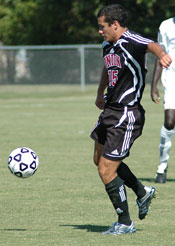
David Wilson from his soccer-playing days as a freshman at Union. (Photo provided)
ÔÇťIt turned out to be a huge blessing in so many ways,ÔÇŁ David says of the experience. ÔÇťA lot of peopleÔÇÖs lives were changed because of it, and my life was changed because of it ÔÇô more than just physically. Spiritually, emotionally, mentally.ÔÇŁ
Flashback to Feb. 5, 2008, when the Union campus was on high alert because of a tornado warning in Jackson. David, a freshman at the time, was waiting out the storm in the Watters Commons playing ping-pong with a few buddies. They moved into the bathrooms for safety at the instruction of the residence director.
The lights flickered and the exterior wall cracked. David hopped down from the countertop where he was sitting and covered up on the floor as the tornado blasted through. The windÔÇÖs force blew him forward onto his face, with his knees pinned to his chest. The building collapsed on top of him, and David couldnÔÇÖt move. For five hours.
He and his fellow prisoners passed the time by singing and praying -- and vomiting -- while they waited for rescue workers to reach them. When the firemen finally got to him and raised him up, DavidÔÇÖs legs didnÔÇÖt drop down.
ÔÇťThe most excruciating pain I think IÔÇÖve ever experienced in my life was when they pulled my legs down,ÔÇŁ David says. ÔÇťMy legs were up, and they pulled them down onto the stretcher and strapped them down. I just remember my hip flexors shooting with pain. The muscle had been so tight for five hours, and then they stretched it out.ÔÇŁ
David may have been out of the hole, but he wasnÔÇÖt out of danger. His legs, especially, were in jeopardy. The next morning, he awoke with his hands tied down and a ventilator in his mouth. He still managed to scribble a note to his parents: ÔÇťDid they find all the boys?ÔÇŁ
ÔÇťYes,ÔÇŁ his mom Annie answered, and David wept.
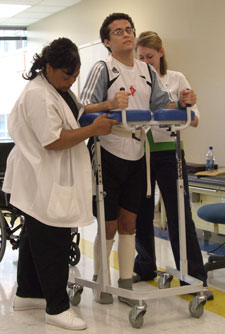
Wilson's injuries from the tornado took weeks of healing and rehabilitation. (Photo provided)
A day later came the fasciotomies ÔÇô four lengthy cuts in each leg to relieve the swelling ÔÇô as doctors fought first to save his life, and then his legs from amputation. Though they won both battles, another issue soon surfaced. David developed a nerve disorder in his foot, a painful condition that had no cure and no effective treatment. David was taking high dosages of painkillers, and doctors said heÔÇÖd likely have to continue doing so for the rest of his life.
ÔÇťWe doubted if heÔÇÖd ever be able to go back to school, or have a job or drive,ÔÇŁ says Mark Wilson, DavidÔÇÖs father.
After a few weeks in the hospital, David got a pass to attend church with his family one Sunday. An attack hit David in the middle of the service. His parents wheeled him into the lobby. He sat there crying, and they sat with him doing the same.
A couple of minutes later, about 10 men from the church came out, knelt around DavidÔÇÖs wheelchair and prayed for him. ÔÇťIt was one of the most special moments we ever had,ÔÇŁ Mark says.
One of the men, a doctor, told the Wilsons about a pain management specialist in his office. When they went to see that specialist, Dr. Gregory Ball, he provided David with much-needed reassurance.
ÔÇťDavid, I know youÔÇÖre hurting,ÔÇŁ Ball told him. ÔÇťI know youÔÇÖre scared. I know you want to go back to school. IÔÇÖm telling you today, itÔÇÖs going to be OK. WeÔÇÖre going to get you back to school, and youÔÇÖre going to be able to minister to people the rest of your life that would never have been in front of you if God hadnÔÇÖt put you through this trial.ÔÇŁ
David spent two months in the hospital for treatment and rehabilitation. On April 11, 2008, he walked out on crutches.
A nerve test that summer showed no feeling anywhere in one of DavidÔÇÖs legs, but yet he could walk. He also hasnÔÇÖt taken any pain medication for two years, despite the doctorsÔÇÖ initial diagnosis.
ÔÇťIt blew their mind,ÔÇŁ he says. ÔÇťThey didnÔÇÖt understand it. It didnÔÇÖt make sense to them. How do you not feel anything, but yet you can still walk? The whole thing has kind of blown everybodyÔÇÖs mind, I guess. I guess thatÔÇÖs what GodÔÇÖs good at, right?ÔÇŁ
David returned to Union for the fall semester in 2008, hobbling on crutches until Thanksgiving, when he put them away and hasnÔÇÖt used them since. He resumed his life as a college student, going to class, hanging out with friends, attending soccer practices and games to watch his former teammates. That process was difficult, because David knew his days playing the game he loved were over. But he says Clovis Simas, the menÔÇÖs soccer coach, and others in the program helped him tremendously by pulling him back in and keeping him a part of the team.
ÔÇťSoccer was fun for me, and I loved it, but it wasnÔÇÖt the reason I came to Union,ÔÇŁ David says. ÔÇťI came here to get an education, with the mindset that I could blow my knee out and never play again. I do feel very blessed that the Lord gave me that sort of outlook on it.ÔÇŁ
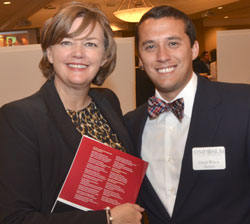
Union Provost Carla Sanderson with Wilson at this year's Scholarship Symposium. (Photo by Morris Abernathy)
On May 1, 2012, David stood in the Carl Grant Events Center for UnionÔÇÖs annual Scholarship Symposium, where nearly 300 students present significant academic research theyÔÇÖve conducted. Sporting a navy blazer and a bow tie, David displayed his poster and discussed his project with interested faculty and students.
Entitled ÔÇťSynthesis of Chromium Quinone Complexes with Nitrogen Donor Ligands,ÔÇŁ DavidÔÇÖs project includes such words as ÔÇťdihydrobenzoquinone,ÔÇŁ ÔÇťtetrahydroxyÔÇŁ and ÔÇťbipyridine.ÔÇŁ The explanation reads like a foreign language to non-chemistry majors.
ÔÇťMe too,ÔÇŁ David quips.
David hopes his work in chemistry will allow him to enter the field about which he is most passionate ÔÇô medicine.
ÔÇťI want to be able to help people in that way because the physicians that I had were so good for me,ÔÇŁ David says. ÔÇťI always wanted to be in medicine. Was I as passionate about it as I am now? No. But I always thought it was something that was interesting.ÔÇŁ
Members of the Union chemistry faculty helped David prepare for that field in the classroom, but their investment in him went beyond academic instruction. One of the things David will always remember is how chemistry professor Mike Salazar called him every day he was in the hospital to check on him and encourage him.
Since then, David has been to the Salazar home several times for meals. He has become a friend to the whole family, learning the names of SalazarÔÇÖs kids, their individual interests and talking to them about the things they enjoy. He relaxes there and plays Wii with the children.
Through this level of interaction, Salazar has noticed an ÔÇťabiding and deep contentmentÔÇŁ in DavidÔÇÖs life.
ÔÇťHeÔÇÖs been through tremendous physical and emotional challenges and has emerged without an attitude or longing for what might have been -- but, instead, with a resting in his current state and for how the Lord will use him given his unique experiences,ÔÇŁ Salazar says.
The symposium was one of the last major events for David in his life at Union. A fifth-year senior whose graduation was delayed because of the semester he missed following the tornado, David has seen all of his close friends ÔÇô comrades with whom he endured the greatest struggle of his life ÔÇô finish their degrees and leave.
David spent his last year completing his classes and devoting much of his time and energy to his soccer coaching at JCS. In the fall, he helped with the JCS girlsÔÇÖ team before his work with the boysÔÇÖ team this spring.
ÔÇťHeÔÇÖs scientific with his words,ÔÇŁ Walker says of David. ÔÇťHeÔÇÖs a man of few words with them. HeÔÇÖs a man of very few emotions, really. Guys like that donÔÇÖt necessarily go over well with high school girls. And yet, somehow, they worship the ground he walks on.ÔÇŁ
David has told his story to both the boysÔÇÖ and girlsÔÇÖ teams, and Walker says while both groups appreciated his testimony, DavidÔÇÖs account especially resonated with the boys.
ÔÇťThey recognize genuine Christianity, and they recognize genuine courage, and high school boys are attracted to that,ÔÇŁ Walker says.
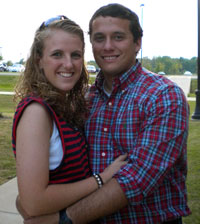
David Wilson and his fiancee Kristen Lee. (Photo provided)
As his final days on the Union campus drew to a close, David looked forward to the future. HeÔÇÖll move back home to Chattanooga after graduation, with plans to apply to medical school. Early next year, he and his fianc├ęe Kristen Lee will marry.
Whatever the rest of his life holds, his time at Union will forever provide a foundation and an influence on the person he is, and the person he will be. His time at the university was unexpectedly colored by a five-hour span he spent pinned under the weight of a collapsed building and the ensuing weeks he spent in a hospital bed. HeÔÇÖs still not where he used to be physically, and he may never be. He can go hiking and mountain biking, but heÔÇÖs quick to acknowledge that tramping down the Appalachian Trail isnÔÇÖt in his immediate future.
ÔÇťThereÔÇÖs still some muscle regrowth happening,ÔÇŁ he says. ÔÇťThe doctors said it would stop after two or three years, but itÔÇÖs been three and a half now and itÔÇÖs still going. They said I wouldnÔÇÖt walk, too. I donÔÇÖt usually believe what they say.ÔÇŁ
Although the memories of that February night are now more than four years old, theyÔÇÖre still a constant companion in DavidÔÇÖs mind ÔÇô never far away from the surface. HeÔÇÖs reminded about his nightmare every time he walks past the memorial marker in the middle of the quads on the Union campus.
The quotes inscribed there are a testament to how the Union community rallied together in their darkest hours, and how Union students, faculty and staff trusted in the goodness of God even in the midst of uncertainty and hardship: ÔÇťOut of the rubble across this campus I am praying that we will see renewalÔÇŁ and ÔÇťWe lost the buildings, but we did not lose the Union spirit,ÔÇŁ from Union President David S. Dockery. Another quote comes from 2 Corinthians: ÔÇťTherefore, we do not lose heart.ÔÇŁ
Those quotes are also a fitting description of the tornadoÔÇÖs effect on DavidÔÇÖs life. HeÔÇÖs a different person now than he was then. His family ÔÇô which includes his sister Kristen and brother Corey, both Union students -- is closer than ever. When his father talks about their lives, he says that the tornado has changed the way they look at nearly everything.
ÔÇťYou learn a lot about whatÔÇÖs important, and most of itÔÇÖs not the things that we spend our time chasing,ÔÇŁ Mark says. ÔÇťSure, you wish he could still play ball, and you wish he could run fast again, but those things really arenÔÇÖt that important. What itÔÇÖs done to his heart, how do you argue with that?ÔÇŁ
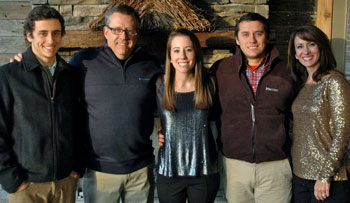
The Wilson family, from left: Corey, Mark, Kristen, David and Annie. (Photo provided)
David knows in the depths of his heart that God is in control and is bigger than he is. He understands how lives can be changed in unexpected ways in a mere moment, and that people donÔÇÖt control nearly as much of their lives as they think. HeÔÇÖs also learned the most about the Lord, about life and about himself through trials and hardships.
ÔÇťWhen everythingÔÇÖs hunky-dory and youÔÇÖre on the mountaintops youÔÇÖre probably not going to be learning as much as you are when youÔÇÖre in the valleys clinging to the cross and hoping for whatever guidance he can give,ÔÇŁ David says.
Still, wouldnÔÇÖt his life have been easier if the tornado had never happened? If he could, would he go back and erase those February events that have forever changed his life?
David says no.
ÔÇťThereÔÇÖve been too many good things that have happened because of it,ÔÇŁ he says. ÔÇťThe reality is that people will be in heaven because of what happened that night. What happened that night had a direct impact on Union students as a whole and their relationship with God and on this university and how it functions.
ÔÇťFrom my life personally, I donÔÇÖt think I would do it any other way,ÔÇŁ he continues. ÔÇťThereÔÇÖs been too much thatÔÇÖs resulted from it ÔÇô too many opportunities to share, too many chances to meet people that I would have never gotten to meet. Yeah, those six, seven, eight months afterward were really hard. ItÔÇÖs still hard, but IÔÇÖve had so many opportunities to meet so many new people that it would be really hard to do another way.ÔÇŁ
Besides, the way he sees it, David only got what he asked for.
ÔÇťEver since I was little, IÔÇÖve always been the good kid,ÔÇŁ he says. ÔÇťI never did drugs. I never drank. I never did any of that stuff. So ever since I was 14 or 15, I kind of prayed that God would give me some situation -- that he would get me out of -- that would give me a way to share my faith.
ÔÇťI didnÔÇÖt pray that I would be in a tornado and that my legs would not work anymore,ÔÇŁ he continues. ÔÇťBut I always hoped that something would happen where I could say, ÔÇśThis is how God has really saved me, and this is what Christianity really means.ÔÇÖÔÇŁ

